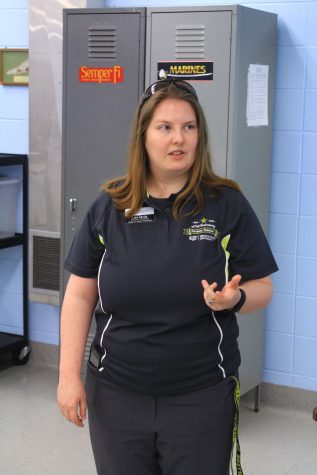Shockers react to education cuts
When Kansas Gov. Sam Brownback visited Wichita West High School two years ago, he seemed to be brimming with pride at what he’d accomplished there from his position in Topeka.
That’s according to West High English teacher Tina Sorensen, a graduate of Wichita State’s College of Education, who admitted she was absent when the governor toured her school.
Sorensen is proud of West High, and pointed out that it’s the hard work of her fellow teachers and administrators that made it great. But when Sorensen heard about the latest round of cuts in public education, she said the news was disheartening.
“To be honest, the first thing I felt was depressed,” Sorensen said. “I feel like this latest news is beating the proverbial dead horse. Like we can’t win. And it’s my kids that will suffer.”
Jacy Beck expressed mixed feelings about Brownback. A WSU freshman planning to study secondary education and math, Beck said she didn’t know much about his policies, but was mystified about the cuts.
“I support Brownback as governor because he’s an elected official,” Beck said, “but I don’t support what he’s doing with education. Education is one of the most important things for us as community — it just doesn’t make any sense.”
Gabriel Beasley, a WSU sophomore, had a similar reaction.
“I don’t have much of an opinion on politics,” he said. “It’s not good that funding for schools is going away, but I’d hope there is a justifiable reason for it to be happening.”
To be fair, although many are surprised by the $44.5 million in education cuts scheduled to begin March 7, Brownback made his intentions clear in his bid for re-election last year. In his “plan for Kansas,” Brownback vowed to lower the tax burden on Kansans from the second highest in the region to the second lowest. Many blame the state’s budget woes on this plan.
The education cuts will take $28 million, or 1.5 percent, out of elementary and secondary education. The governor is also taking more than $16 million, or 2 percent, from higher education, including $1.5 million from WSU. That cut is also no surprise — Brownback campaigned for it in 2013 when it was lawmakers who sought to cut funds for state colleges and universities.
One student, Christopher Elzinga, a senior studying Spanish and strategic communication, called Brownback’s plan an ignorant move.
“You can’t cut the education budget by $45 million and expect the same results from schools,” Elzinga said. “Education is the foundation of our lives. We spend at least the first 20 years going to school to prepare us for bigger and better things.”
He was also concerned that teachers would bear a greater burden.
“Teachers already don’t get paid enough,” he said, “and have barely enough money to do the things they do with their students, so what are they going to do now? Use their own money?”
And, Sorensen said, they already do.
“Everything I provide for my classrooms comes out of my paycheck,” she said.
Brownback, Sorensen said, is focused solely on test results and bottom lines.
“There are all these things they want us to do,” she said, “but they’re stripping us of the funds to do them. They want us to raise scores and teach technology, but they won’t give us money to buy any.
“A lot of teachers are talking about leaving Kansas because of Brownback and what he’s doing to education throughout the state.”
Beck was concerned the cuts would start showing up at WSU soon.
“If our budget is cut as a university, Wichita State is going to have to make some difficult decisions,” she said. “The university will have to raise tuition or cut amenities, so it’s something that’s going to affect all of us.”
University President John Bardo said in a statement last week he would continue to focus on implementing the university’s strategic mission, vision and goals in spite of the cuts.
“The budget decision announced today is unfortunate and could slow us down a bit,” Bardo said in a Feb. 5 statement, “but we are moving forward with our plans to support the people of Kansas.”
One thing the $1.5 million loss to WSU’s budget won’t affect are funds earmarked to teach future educators.
“The recently announced budget cuts to public education do not affect scholarships offered by the College of Education,” said Patrice Hein, a spokesperson for the College of Education. “Scholarships in the College of Education primarily come from private donations made for that purpose to the WSU Foundation.”
The recipients of the largest of those privately funded scholarships, the Klose Scholarship Essay Competition, were recently announced. Chosen as this year’s Klose Scholars were Leon Chau of Wichita Heights High School, Krystine Phillips of Wichita Kapaun Mt. Carmel Catholic High School and Hannah Morrical of Lindsborg Smoky Valley High School.
The money for their education comes from the $7.5 million estate of Doris and Ralph Klose, the largest known gift of its kind for math and science education scholarships.
Chau, Phillips and Morrical won’t need to worry about having their funding cut.
But the bottom line for Kansans, Elzinga said, is that they should have known state cuts were coming.
“If you decrease the amount of money you take from one place, you are going to have to increase the amount you take from another,” he said. “Cutting taxes will make people happy at first, but in the end, someone has to pay.”









